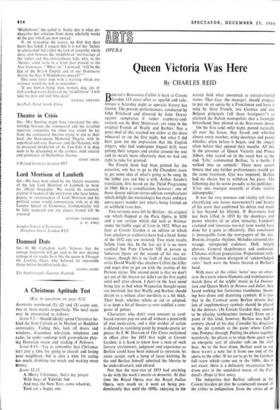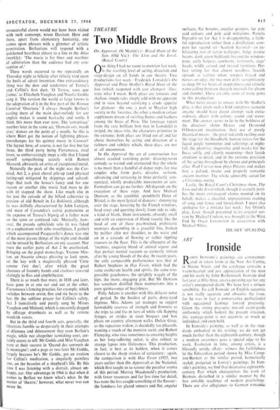Queen Victoria Was Here
OPERA
By CHARLES REID
No French book had been printed for the occasion; one has to go to the Choudens score to get some idea of what's going to be sung. In the lobby you can buy a crib, Arthur Jacobs's translation, first heard on the Third Programme in 1960. Here a complication, however: one of those dreary edition-versus-edition complications which delight the musicologist but make ordinary opera-goers wonder just what's being foisted on or withheld from him.
Two versions were left by Berlioz: the original one which flopped at the Paris Opera in 1838 and a cut version which did well at Weimar under the noble aegis of Liszt in 1852. What we hear at Covent Garden is an edition in which four scholars or archivists have had a hand. Some of the 1852 cuts are restored. Two main results . follow from this. In the last act it is no mere cardinal but Pope Clement VII in person (a ludicrous figure on the second of his two en- trances, though this is no fault of that excellent artist David Ward) who absolves Cellini the killer and urges him to get on with the casting of his Perseus statue. The second point is that we don't get out of the theatre (or didn't on the first night) until well after eleven. I don't in the least mind being late to bed when Wagnerian thought-spans are involved; but that Wailly and Barbier should detain us a minute after ten-thirty is a bit thick. Their book, whether whole or cut or adapted, is as inept a bit of theatre as ever saddled a com- poser of genius.
Characters who don't even amount to card- board cutouts pop on and off without a penn'orth of true motivation, and a thin residue of action is diluted to vanishing point by psuedo-poetic set pieces. As J. W. Davison of The Times exclaimed in effect after the 1853 first night at Covent Garden, it is hard to know how a man of such literary attainments, judgment and experience as Berlioz could have been induced to entertain, let alone accept, such a lump of loose knitting. In the end Berlioz himself admitted the libretto to be under-dramatic and absurd.
Not that the near-riot of 1853 had anything to do with the work's merits or demerits. At that time the Royal Opera was the Royal Italian Opera, very much so; it went on being pre- dominantly that until the 1890s, enjoying in the artistic field what amounted to extraterritorial status. That Gye, the manager, should propose to put on an opera by a Frenchman and have it sung by three French, two German and one Belgian principals call those foreigners!') so alarmed the Italian monopolists that a fortnight beforehand they plotted to do Benvenuto down.
On the first (and only) night, posted tactically all over the house, they hissed and whistled almost every number, using doorkeys and penny whistles, often before it began, and the singers often before they opened their mouths. All this in the presence of Queen Victoria and Prince Albert, who stayed on in the royal box to the end. 'Life,' commented Berlioz, 'is a battle. I walked into an ambush.' There were covert threats that any further performances would get the same treatment. Gye was impotent. Berlioz had no choice but to withdraw his piece. The following day he wrote proudly to his publisher: `C'est une musique nouvelle et d'une vitalite indomptable.'
It was the very newness and vitality (all those electrifying con fuoco movements!) and beauty of his score that confirmed his defeat and made it last beyond his lifetime. If Benvenuto had not been killed in 1853 by the doorkeys and penny whistles of an alien minority, London's cramped and timorous musical taste would have done for it quite as effectively. This conclusion is inescapable from the newspapers of the day. Broken, irregular rhythms. Melodies tortured into strange, unexpected cadences. Dull, insipid phrases. General shapelessness and confusion. Climaxes without preparation. Preparations with- out climax. Wanton disregard of 'acknowledged rules.' Such were the bricks thrown at Berlioz's head.
With most of the critics 'noise' was an obses- sion. In a score whose filaments and translucencies match those of the sylphs' music in La Damna- tion and Queen Mab's in Romeo and Juliet, they heard nothing but fortissimo trombones, boom- ing bass drum and shattering cymbals. It is true that in the Carnival scene Berlioz directs that lots of supplementary cymbals should be played by the dancers. (At Covent Garden they seemed to be playing tambourines instead.) Even on a point of this kind, however, Berlioz was half a century ahead of his day. Consider his direction to the pit cymbals at the point where Cellini runs Pompeo through. Putting the plates together noiselessly, the player is to whip them apart with an energetic sort of circular rub on the vital beat. As to the bass drum, Berlioz used to say there wasn't a note for it from one end of the opera to the other. If we are to go by the German full score which came out in the 1880s, this is not exact; there is a delicately imaginative bass drum part in the sepulchral music of the Car- dinal's (Pope's) first entry.
The indignities that Berlioz suffered in the Covent Garden pit (for he conducted) moved all the critics to indignation. Even the antics of an unsuccessful clown would not have been visited with such contempt, wrote Davison. Here and there, apart from elementary humanity, one comes upon phrases with a glimmer of artistic penetration. Berliozians will respond with a quickened heartbeat almost to a line in the Atlas (weekly): 'The music is far finer and worthier of admiration than the audience had any con- ception of.'
These words occurred to me repeatedly on Thursday night as felicity after felicity trod upon the heels of adroit invention. One extraordinary thing was the dew and tenderness of Teresa's and Cellini's first duet, '0 Teresa, vous que j'aime,' as Elizabeth Vaughan and Nicolai Gedda sang it. The version the world at large knows is the adaptation of it in the first part of the Roman Carnival 'Overture.' I always thought Berlioz's casting there of the main duet-melody for cor anglais makes it sound backachy and senile. I think this more than ever now. The 'conspiracy' number later in the same act, `Demain soir, mardi gras,' dances on the point of a needle. So this is where Bizet got the notion of lightning phrase- interchanges for his quintet music in Carmen! The layout here, of course, is not for five but for three, the third party being Fieramosca, rival lover, so embarrassingly inept a role that I found myself sympathising acutely with Robert Massard, obviously an artist of exceptional metal.
Naturally the peak of the night was the Car- nival, Act 2, a great choral pile-up (and physical tiering-up) mitigated by skippings and saltarel- lings that took the house's fancy and for one reason or another (the music had most to do with it) stopped the show. Like much else in the text the episode of the bilked cabaretier (a preview of old Benoit in La Boheme), although he was skilfully characterised by John Lanigan, and most of Cassandra's satiric pantomime at the expense of Teresa's bigwig of a father were on the tame or confused side. Musically, how- ever, the pseudo ophicleide solo (it was faked on a euphonium with tuba mouthpiece, I gather) which accompanied Pasquarello's dance was one of the most joyous things of the night and should not be missed by Berliozians on any account. Nor must the earlier parts of Act 2 be overlooked. Bringing on the papal moneybags, Yvonne Min- ton, an Ascanio always pleasing to look upon, set the key with a magistrally phrased `Cette somme rest due'; after which the great choruses of foundry hands and ciseleurs towered elatingly to flies and amphitheatre.
There is so much that must, in 1838 and later, have gone in at one ear and out at the other. Fieramosca's fencing practice, for example, which switches between seven, five and six beats to the bar. Or the sublime prayer for Cellini's safety, Act 3 (sensitively and purely sung by Misses Vaughan and Minton), which is uncannily dogged by offstage drumbeats as well as by remote monkish voices.
But in the third and fourth acts, generally, the librettists fumble so desperately in their attempts at dilemma and denouement that even Berlioz's magic, while not altogether tarnishing over, cer- tainly ceases to tell. Mr Gedda and Miss Vaughan were at their suavest in `Quand des sommets de la montagne'; and a page or two later Mr Gedda, largely because he's Mr Gedda, got an ovation for Cellini's meditation, a singularly pointless One, on the beauties of a shepherd's life. By this time I was listening with a distrait, almost un- happy, ear. Our advantage in 1966 is that when it comes to Berlioz we know what's what. In the matter of 'theatre,' however, what never was can never be.































 Previous page
Previous page